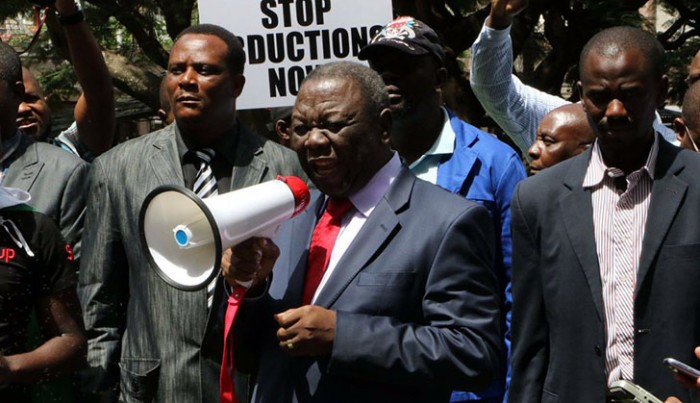MDC-T abandons coalition talks
By Andrew Kunambura
The Movement for Democratic Change (MDC-T) has abandoned coalition talks with other opposition parties ahead of decisive 2018 elections, as it prepares a final assault against President Robert Mugabe’s ruling ZANU-PF party.

This is despite a joint Independence Day statement by the opposition parties, which many thought gave a cue that a grand coalition against President Mugabe’s ZANU-PF was close to being realised.
Sources within the MDC-T, led by former prime minister Morgan Tsvangirai, said they believed their party would win Zimbabwe’s forthcoming elections, notwithstanding their defeat at 2013 polls many allege were massively rigged by the ruling party.
Tsvangirai staged an unprecedented election victory against President Mugabe in 2008 harmonised elections, but failed to garner enough votes to be declared a winner after getting 47,9 percent of the vote against President Mugabe’s 43,2 percent.
In terms of the old constitution, a winner required 50,1 percent of votes to be declared President. Simba Makoni, of Mavambo/Kusile/Dawn (MKD) movement, had garnered eight percent of the presidential vote.
That election went into a run-off, from which Tsvangirai pulled out citing violence and the alleged murder of at least 200 of his supporters.
President Mugabe went on to win the run-off election, but an unprecedented economic and political crisis forced him into talks that resulted in the formation of a government of national unity (GNU), which included Tsvangirai’s party and a breakaway MDC formation then led by Arthur Mutambara but now headed by Welshman Ncube.
Elections that were later held in 2013 gave ZANU-PF and President Mugabe an unexpected landslide victory, which astounded ZANU-PF members and rivals alike as it had been largely unexpected.
But ever since that election victory, which resulted in the termination of the GNU, ZANU-PF has been plagued by internal fights, which resulted in the sacking of former vice president Joice Mujuru and several of her allies, most of whom were bigwigs in ZANU-PF.
Mujuru now leads the recently formed Zimbabwe People First, said to be part of a planned grand coalition of opposition parties. The opposition parties had in recent months been reportedly making strides towards the formation of the grand coalition, whose major purpose would be to confront President Mugabe and ZANU-PF at 2018 polls.
Their major achievement to date had been to narrow their areas of conflict, while working closely in areas of common interest, such as electoral reforms.
The other opposition parties in the planned coalition were MKD, ZAPU led by Dumiso Dabengwa, Lovemore Madhuku’s National Constitutional Assembly (NCA), People’s Democratic Party ed by former finance minister, Tendai Biti and Ncube’s MDC party.
Dabengwa, Makoni and Mujuru broke away from ZANU-PF while Biti and Ncube broke away from Tsvangirai’s MDC. Tsvangirai had been a founder chairman of the NCA, which was a lobby group for constitutional reforms before it was turned into a political party by Madhuku.
The grand coalition was also expected to rope in civic society groups and churches for a final assault against what may now be a weakened ZANU-PF.
Information reaching the Financial Gazette suggests that the MDC-T is now pulling in a different direction, with its National Standing Committee (NSC) having already decided not to pursue the coalition agenda.
Sources at Harvest House, the MDC-T’s headquarters, said the NSC had met at the end of last month and made the decision. The NSC comprises of six heads of departments. It also includes Tsvangirai and his deputy, Thokozani Khupe.
MDC-T secretary-general, Douglas Mwonzora, confirmed when contacted for comment that they were no longer pursuing coalition talks but were instead focusing on their programmes.
He said the party, which made a huge political statement after a well attended protest march in Harare last week, had decided to concentrate on rebuilding structures.
Mwonzora said their decision was informed by the realisation that the MDC-T still had enough support to see it through any election.
“I can confirm that the party has decided to shelve any coalition plans. We have carefully analysed the situation and realised that other opposition parties do not have much to give to the coalition in terms of following.
“They do not have any significant following and so we have said let us concentrate on rebuilding our party and strengthening it,” said Mwonzora.
He said they hoped the other opposition parties were “also on the ground strengthening their own parties so that they can come forward to say we have this to offer”.
Mwonzora said the MDC-T’s standing committee had resolved to “carefully study” any overtures for coalition by other parties and would report regularly to the National Council.
“We won’t plunge blindly into a coalition without carefully analysing the merits and demerits of such a move. The president’s office has been given that task and will report regularly to the National Council,” he said.
He added: “We have always said we are prepared to work with any progressive parties but we are not going to rush into anything.”
Asked if he thought the party had the capacity to topple President Mugabe’s party in 2018 through the ballot, Mwonzora said: “We have won elections before and we believe we are strong enough to win any election.”
Zimbabwe’s opposition parties have significant ideological differences, and simply agree on removing President Mugabe from power. Financial Gazette






